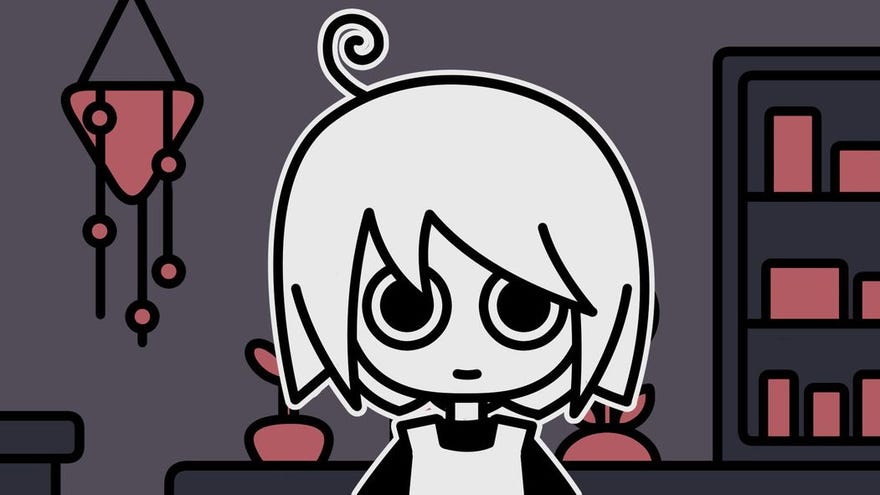A Year Of Springs dev npckc "never planned" on making games, but wanted to tell kinder LGBTQ+ stories
Plus, making a horror game when you're scared of everything
To call the current state of the world today ‘tumultuous’ would be a bit of an understatement. For LGBTQ+ people - and trans people in particular - the increasingly extreme rhetoric and legislation being weaponised against these communities can feel all-consuming. Yet it comes at a time when diverse representation in media, including games, is improving. As the number of characters stated to LGBTQ+ grows, what is more effective representation: making it possible to see your own experiences on screen, or make those experiences understandable to someone who isn't LGBTQ+?
People who know of it would perhaps cite the work of developer and translator npckc, who I recently spoke with at the recent Japanese indie gaming event Bitsummit. They were there to showcase their latest game A Pet Shop After Dark, a departure from visual novels like A Year Of Springs trilogy into horror storytelling ("more spooky than outright horror," as they later clarified) that's set to release later this month. Beyond the trilogy and their newest work, they’ve translated the works of other developers and worked on other smaller games and game jam projects.
The Springs series, centering around Haru, Erika and Manami, has become beloved by players around the world in part for their grounded representation of queerness and transness in a way rarely seen in games. The first game, One Night Hot Springs, is about the concerns trans people face with public bathrooms told through the realities of navigating a trip with friends to a Japanese onsen. The second, Last Day Of Spring, tackles a similar topic from a friend who is initially unaware of these difficulties and Japan’s rules for changing legal gender, while the third, Spring Leaves No Flowers, touches on asexuality.
"I wanted to create something that would happen if things were just a little bit kinder."
These are personal stories npckc wanted to tell, while also being inspired by real events in Japan. At the time the first game went into development, reports were circulating in the Japanese media about a trans women arrested at a bathhouse for entering what patrons had assumed was the wrong facilities. "This was a very short article, but a lot of the reaction was very harsh," they explained. "People were like ‘Why would anyone think this was ok, they are completely not feminine, they’re too tall, their voice is obviously not that of a woman.’ For me to see that was really stressful, so I wanted to create something that would happen if things were just a little bit kinder."
This development philosophy extended to the sequels, games that were never initially intended to be made, but came about where the news allowed these characters to become a vehicle for discussion. "I never planned on being a game developer. I never planned on making games," as npckc put it. "It’s just that there’s always been something happening in the news and I feel like this is something I want to express. I want other people to see, so I just kind-of make it happen." The second Springs game, for example, came with the changing of the era in Japan from Heisei to Reiwa, with the idea this could be a new start and better future for everyone. By contrast, at the same time the courts upheld laws requiring trans people to sterilise themselves, be single and have no children under the age of 20 in order to change their legal gender.
And even in the years since, this issue has persisted. Japanese support for same-sex marriage recently rose to 65% in polls with particularly high support amongst young people. On the other hand, the ruling Liberal Democratic Party lawmakers are under scrutiny for anti-LGBTQ+ material distributed during a recent event, and remain opposed to introducing legislation for greater support and protections. Meanwhile, as many regions introduce local ordinances recognizing same-sex relationships, nationwide same-sex marriage remains far away, and court rulings about the constitutionality of banning same-sex marriage are inconsistent. Courts in Osaka ruled it was constitutional just months after Sapporo said otherwise.
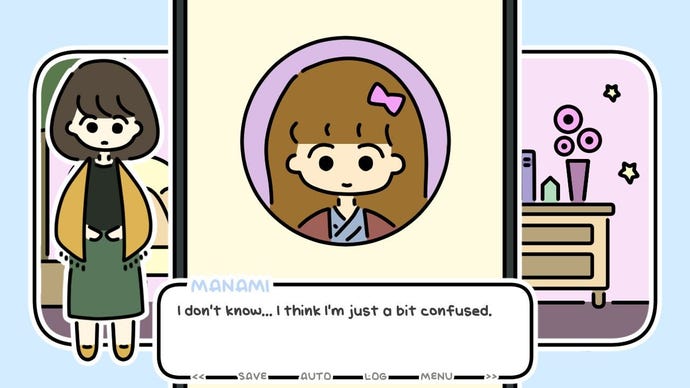
"The whole thing about the new era was that things are going to get better for everyone, but a lot of times people don’t include queer people into what they think to be everyone, and don’t realise we’re just living here like everyone else," said npckc. "How come people can’t empathise? So I want to make stories about that and be like, ‘This is how some people are feeling.’ If people play these games and resonate with them? That’s my goal with games a lot of the time."
There’s something to be said about the potential of games for empathy. When executed correctly, the act of interactivity, of assuming the role of a character, places you further into their shoes than is ever possible with a movie. It’s what inspired npckc to learn Unity, to make games and tell these stories with this medium. If a person, not from bigotry but from a lack of understanding, has never had it occur to them that queer and trans people may find difficulty in such everyday situations, games could be a window for learning and understanding.
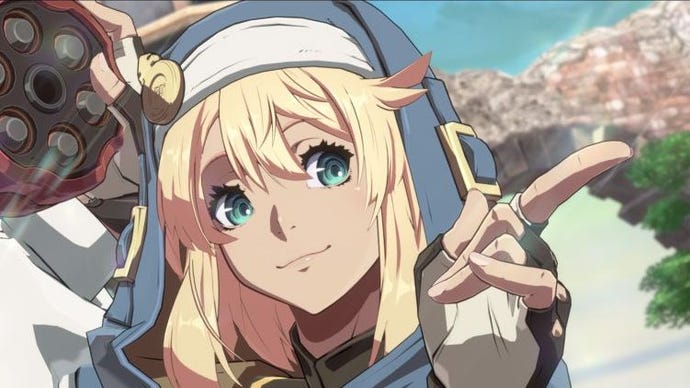
It is something the industry as a whole is seeking to improve on. Most recently we’ve seen the canonisation of Bridget from the Guilty Gear franchise as a trans women, while Zero Escape and AI: The Somnium Files developer Kotaro Uchikoshi has responded strongly against people upset that his latest title includes a non-binary character. There’s clear, visible growth in how developers in Japan are approaching the topic, with even the evolution of Bridget as a character (who was previously presented as a boy) to a trans woman as an example of how developers have become increasingly open to including these perspectives.
In a country where discrimination persists, and education on other identities is only starting to become more common (both in schools and in society), the process of featuring these perspectives can be difficult. "I think I'm very fortunate because I live in Japan, but I've lived elsewhere as well, so I have the experience of being connected to non-Japanese creators as well as Japanese ones," noted npckc. "A lot of the times when there is representation in Japanese media, it is often not created by people of the same minority. Which is not necessarily a bad thing, but I think it's harder for minorities to share their own experiences, partly because it's not very common yet, for one, and it's kind of scary because they don't know if people will look at it."
"There also aren't very many spaces that are openly queer-friendly," they explained. "I have talked to places here about possibly including this in codes of conduct, but I've been told that if we include LGBT people and we say it's okay, we'll make it sound like we’re discriminating against non-queer people, and things like that are still very common. So it's a bit hard."
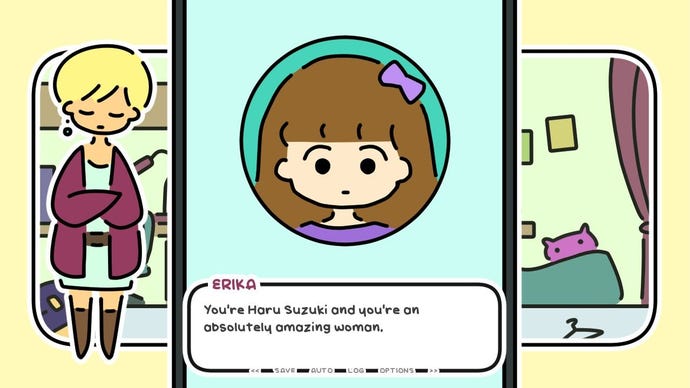
But this doesn’t mean a tide isn’t growing to change this, even beyond these creators and allies actively pushing for representation. There’s an edge of a precipice here in terms of more openly-queer games being released to the public - but making the step to be open about your own experiences or sharing those of others is far from simple. "There’s a lot of queer people already making games here [in Japan], they’re just not as open about it as I am," npckc explained. "Sometimes I think that, from an overseas view, people forget that people in Japan are also queer and there’s a lot of people making that sort of media, but sometimes the industry makes it hard to talk about it. But I think it’s changing a little bit. I’ve been lucky to have people see my games and to talk about them in the Japanese media, and I’ve just actually had two other devs come up to me and talk about how they’re also asexual and they’d like to make stuff like that in the future."
"I can’t do jump scares and I turn off the music when I play horror games, I’m scared of everything."
npckc's next game takes things down a slightly different path, as they're working on a suspenseful puzzle-based visual novel, A Pet Shop After Dark. The game has its roots in a 2020 Game Jam project, which they initially put together over the course of just two weeks, before returning to the idea recently.
"I enjoyed that experience, but I put it down and put it away and went on to make other things," said npckc on the game’s origins. "But I want to try being able to tell different stories as well so I went back and thought I should expand this into a full game. I don’t want to make anything that’s too scary for me to play, though, because I’m sorry, I can’t do jump scares and I turn off the music when I play horror games, I’m scared of everything."
How do even make a horror game when you’re scared of horror? "It’s difficult! I can’t listen to the music too long as the composer has made it too scary, I turn it down, which isn’t very efficient," they said. "I’m skipping through text like I want to focus on this part. If I’m feeling unsettled, though, probably someone else will feel scared too."
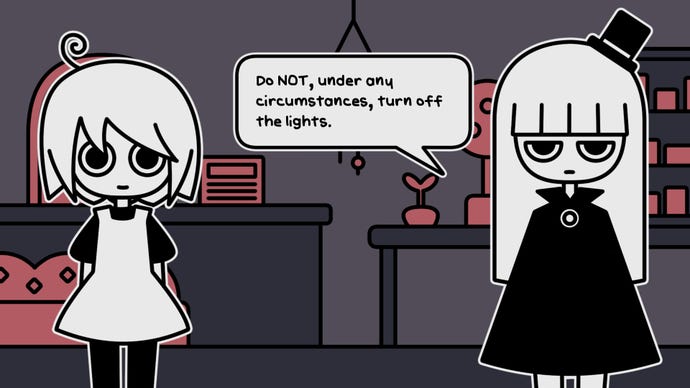
Yet it’s more than just a tonal departure. The level of interactivity offered in the puzzles isn’t new for npckc (they recently released A Hero And A Garden which blends clicker gameplay and visual novel), but it’s still something introduced to this game that is new for the games they’ve put together, and is partially the result of the genre. "For horror people don’t just want to sit there and read a lot, or you kinda lose that scary feeling, you have to intersperse a lot more," they explained. "What I’ve tried to do is that at the beginning, to set up the atmosphere, I have a lot of text like the opening to a horror novel. But after that you always have things changing in the background, the music is changing, stuff is happening so you don’t lose the creepy-crawlyness feeling."
The more time I spent talking with npckc, the more their passion for making games, the industry, and ensuring their own experiences and those of others are amplified became apparent. They talked about their future hopes: to continue learning Unity as they make more games, and even make titles where you move the character like an RPG Maker-style of game. Being at an event like Bitsummit introduces so many games to us, but at a Japanese event like this it’s also a chance to play and speak with Japanese developers and get an insight into a growing Japanese independent and doujin gaming scene that’s typically overlooked - particularly, perhaps, if it isn’t leaning into an overtly-Japanese visual aesthetic.
There are lots of interesting, unique experiences in the indie scene in Japan, and the games from npckc are no different. These short visual novel and bitesized game experiences are varied and unique in terms of subject and style, but they all open up into these engaging and wonderfully woven stories, and often feature open explorations of gender and sexual identity. They’re stories that continue to inspire, and as npckc continues to expand their skills and storytelling through Pet Shop After Dark and beyond, whatever comes next will be worth experiencing.
